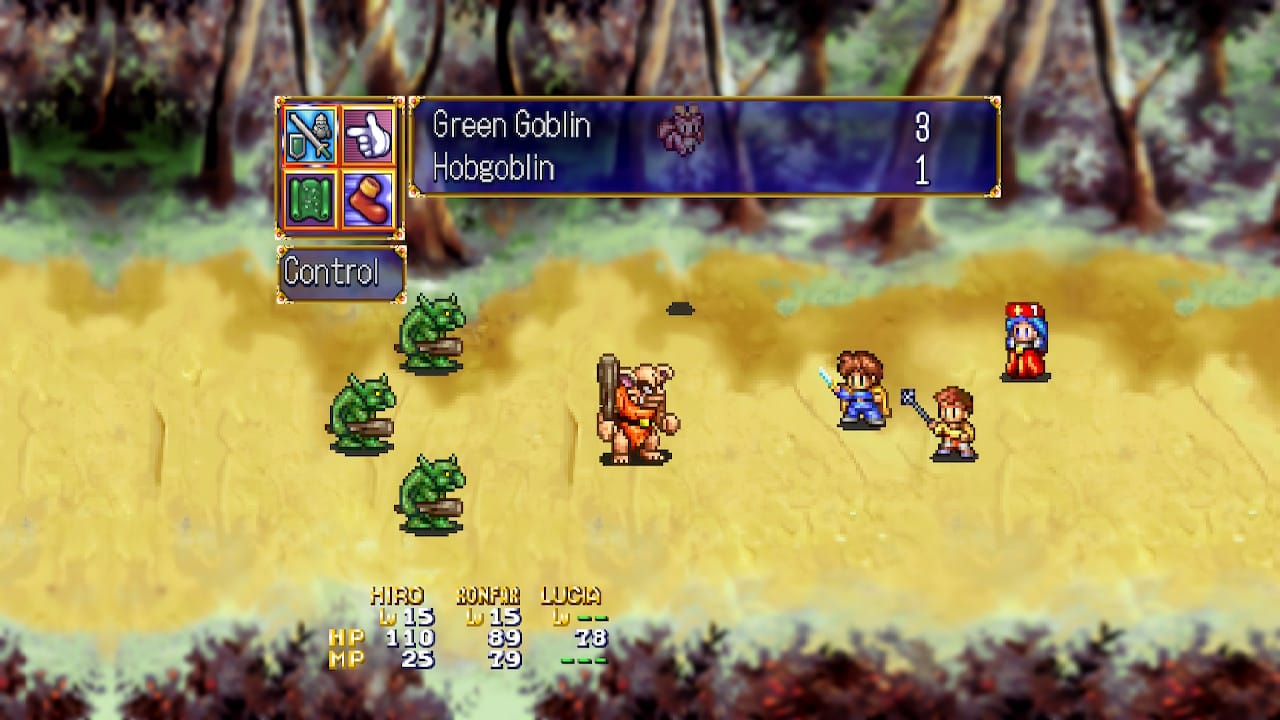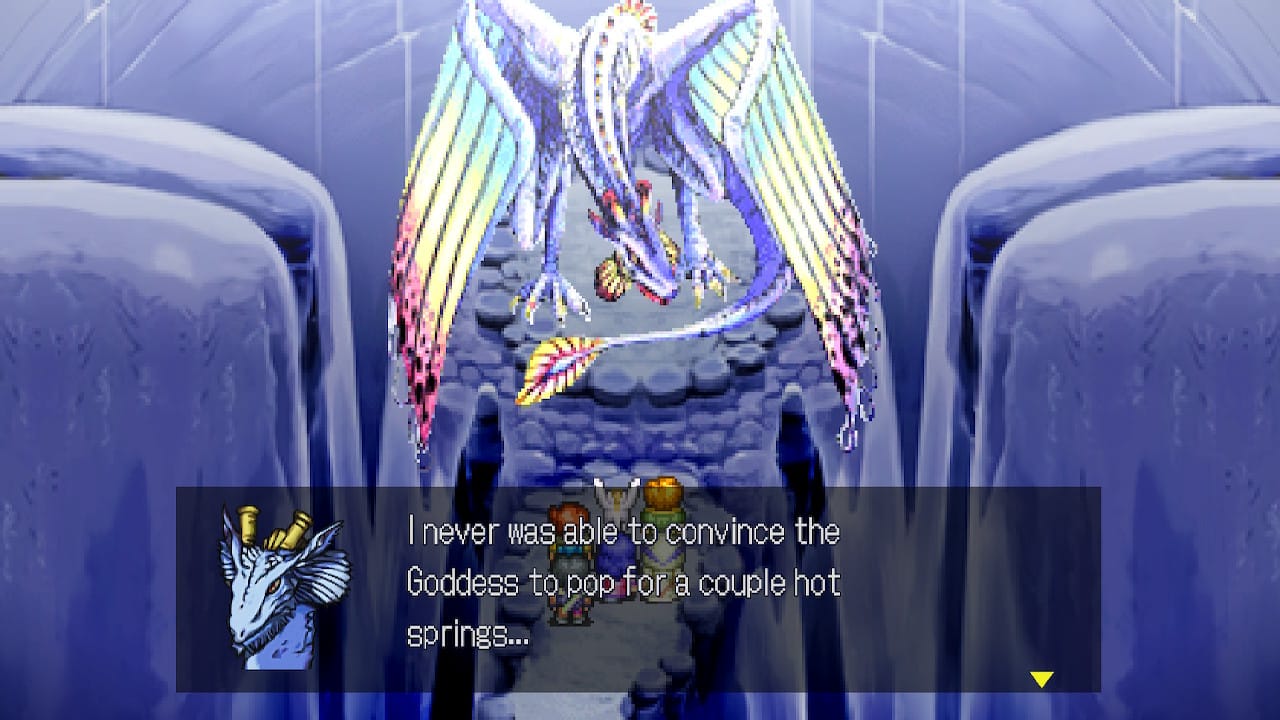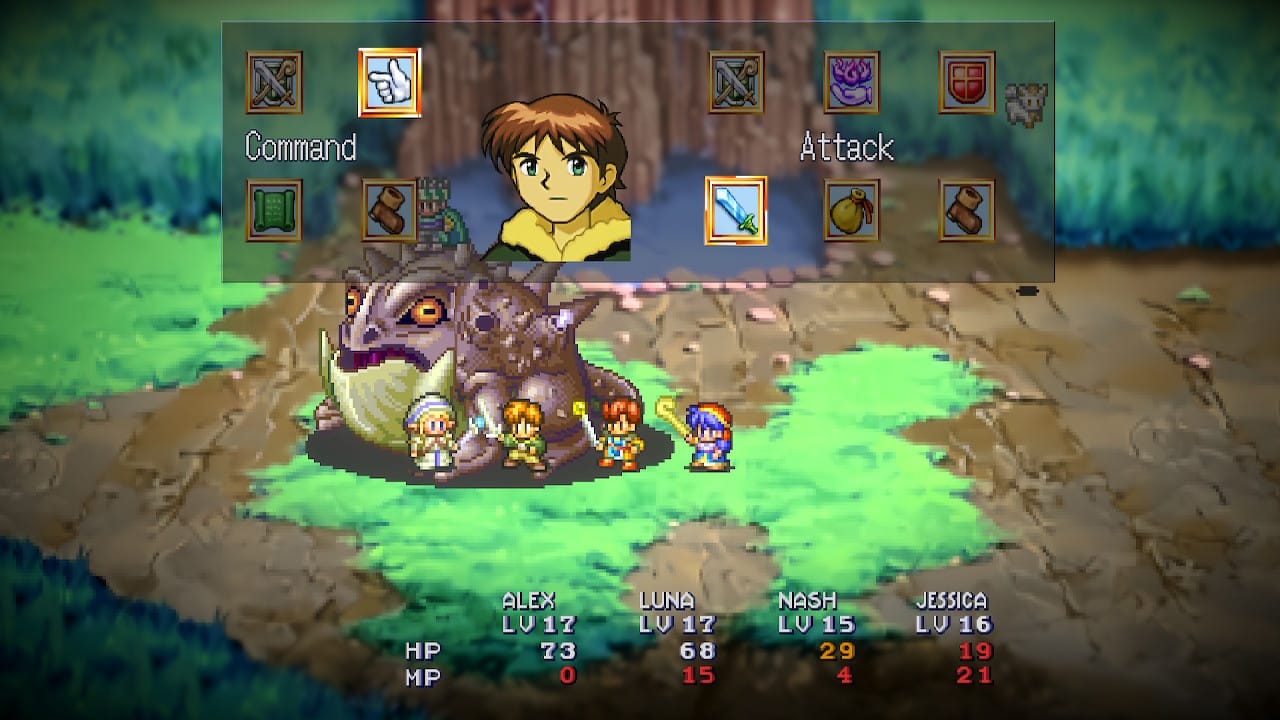The Lunar games are very special to me. It’s not that I played them at a particularly formative time or they helped me through something; they’re just incredibly cozy and I haven’t found any games quite like them since. They’re funny, sincere, and all around just fun. I was introduced to this turn-based RPG series through the PSP remake, but they actually started as Sega CD games, being some of the first to use FMVs for anime cutscenes and voice acting. Since that add-on… wasn’t too popular, the games were then remade for the PS1, which have now been remastered for modern consoles and PC.
Lunar: Silver Star Story follows Alex as he journeys to become the next Dragonmaster, like his hero Dyne. He meets various friends on his adventures, and they are eventually called to save the world and Alex’s childhood love. It’s a sweet story, and while you’ll be able to see every plot beat coming, that doesn’t make it any less enjoyable. In fact, I’d say the fact that it is so tropey and predictable makes it better. The tropes are just so well done. It’s very sincere and that’s what makes the game special.
Lunar 2: Eternal Blue puts players in the shoes of Hiro, a boy living with his grandfather. The two love digging up old ruins, and a tower to the north of their home seems to have just lit up. Inside they find a girl, Lucia, who has been sent from the Blue Star to speak with the goddess Althena and stop the machinations of the evil Zophar. However, the leader of Althena’s guard has been tasked by the goddess to kill her, believing her to be The Destroyer of legend. Hiro and Lucia find themselves on the run, all while making their way towards a city full of people who may also want Lucia dead.
While their stories may be different, their battle systems are not. Both games are turn-based, with players choosing actions for the whole party then watching things play out in a large arena. Characters can attack, cast a spell, use an ability, use an item, or defend. Some actions may require a character to move across the battlefield, but they can only move so far in a turn. You need to consider if your action is within range before executing it. Some characters will be able to move further or attack more than once on their turn, so it can be satisfying to have, for example, Alex take out three weaker enemies just by pressing attack on one. It’s all the little things that make Lunar a joy to play.

That’s about as complicated as battles get. You’ll find some tougher than normal encounters in some areas and in boss fights, but this is largely a breezy experience. Lunar 1 even has an optional inventory update you can toggle in the settings, letting any character access the full party inventory rather than having separate inventories for each character. It’s super handy, and doesn’t really make the game easier, just mitigates the need to spend time making sure everyone is supplied.
The little things are really what make these games so delightful. One of my favorite touches is that your main healer in Lunar 1, Jessica, also joins the party with a higher physical attack than the main character. This creates an interesting dynamic where you’ll put arguably the most important party member in more danger so she’ll have to heal less overall, or keep her in the back and allow battles to last just a bit longer. You can get by just fine on either strategy, but it’s a fun point of choice. The games are full of small variations on typical JRPGs, either mechanically or story-wise, like with the humor.

This remaster uses the JP release as its base, which means the adjustments Working Designs made to the difficulty are nowhere to be found here. The games have also received some visual touch ups, like running at higher resolutions, being in widescreen, and some optional post-processing effects. I didn’t really like the post-processing; it adds some depth of field and makes the top of the screen brighter, so I turned it off. The games use the same music, so it’s just as good as you remember, but the voice acting has been completely rerecorded with new actors. It’s certainly not as 90s anime as previous dubs, as the new translation removes some gags the original localization added, but these are all very competent actors and they give great performances here. It’s a lot more grounded, and this includes things like Luna’s boat song (a gorgeous vocal piece near the start of your adventure) so I think it ultimately comes down to preference. It would have been nice to have all previous dubs here as well, but generally I like the new one just fine.
If you really want to go old school, at least visually, you can play the games in their PS1 resolutions. You can’t swap to these in-game, but your saves do carry over between the two when picking from the launcher. It would have been nice to include all the other versions of these games, such as the original Sega CD, but for just the PS1 versions this feels like a very comprehensive remaster.

It’s not without issues, however. On Switch, there’s a persistent visual shimmering with backgrounds while in motion. In some areas I also noticed a line of junk pixels at the top of the screen. Something that carried over from the original version that I really could have done without is Hiro’s movement speed in dungeons. It’s significantly slower than in towns or the overworld to give you some incentive to use the run button. Pressing the run button only lets you run for a second or two, and you can’t run again until a lengthy cooldown finishes. This is one gameplay quirk that is simply annoying, and it would be nice to have an option to give Hiro his default walking speed in dungeons.
Lunar Remastered Collection
Great
The Lunar games are delightful, classic RPGs, and the Lunar Remastered Collection makes them easier to play than ever. It doesn’t bring together all versions of each game for a truly comprehensive look at the series’ history, but it is a faithful update to the PS1 remakes.
Pros
- Incredibly cozy
- New voice acting is great
- Widescreen support
Cons
- Post-processing can look too busy
- No Sega CD or PSP versions
- Some visual hiccups
This review is based on a retail Nintendo Switch copy provided by the publisher.





















